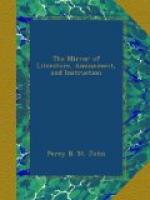The secret use which was thus made of scientific discoveries and of remarkable inventions, has no doubt prevented many of them from reaching the present times; but though we are very ill informed respecting the progress of the ancients in various departments of the physical sciences, yet we have sufficient evidence that almost every branch of knowledge had contributed its wonders to the magician’s budget, and we may even obtain some insight into the scientific acquirements of former ages, by a diligent study of their fables and their miracles.
(In the second letter, upon Ocular Illusions, is the following beautiful passage on the Eye:—)
This wonderful organ may be considered as the sentinel which guards the pass between the worlds of matter and of spirit, and through which all their communications are interchanged. The optic nerve is the channel by which the mind peruses the hand-writing of Nature on the retina, and through which it transfers to that material tablet its decisions and its creations. The eye is consequently the principal seat of the supernatural. When the indications of the marvellous are addressed to us through the ear, the mind may be startled without being deceived, and reason may succeed in suggesting some probable source of the illusion by which we have been alarmed. But when the eye in solitude sees before it the forms of life, fresh in their colours and vivid in their outline; when distant or departed friends are suddenly presented to its view; when visible bodies disappear and reappear without any intelligible cause; and when it beholds objects, whether real or imaginary, for whose presence no cause can be assigned, the conviction of supernatural agency becomes under ordinary circumstances unavoidable. Hence it is not only an amusing but an useful occupation to acquire a knowledge of those causes which are capable of producing so strange a belief, whether it arises from the delusions which the mind practises upon itself, or from the dexterity and science of others.
(The Optical phenomena, as might be expected, are most abundant, as they include the subject of spectral illusions and apparitions, and natural phenomena marked with the marvellous. The properties of Sound are next in interest; among them we find explained the wonder of singers breaking glasses with their great power of voice; the automaton flute-player, talking engines, echoes, &c. The Mechanical causes are less numerous: among them we are glad to see noticed the feat of lifting heavy persons, which we ourselves have often seen accomplished; but Sir David Brewster does not supply the cause. As the matter may be new to many readers, we quote the two relating pages.)




